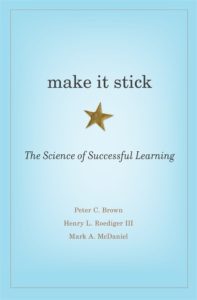
Eton’s Centre for Innovation and Research in Learning (CIRL) recently joined forces with the Education and Psychology Societies to welcome the authors of Make it Stick: The Science of Successful Learning to the virtual stage. The science of learning is an interdisciplinary field that aims to help us understand how we learn, by drawing upon evidence from the natural, cognitive and psychological sciences, and through doing so, improving educational outcomes.
A central question the science of learning poses is, ‘how can students become better learners?’, It aims to help teachers replace ineffective teaching and learning strategies with more effective ones. In a webinar to Eton students, staff and partner schools, Peter Brown, Henry Roediger and Mark McDaniel stressed that while individual students often develop learning methods which prove effective for them, understanding how and why these work is key to our development. Therefore, teaching such methods explicitly (including techniques such as spaced practice, retrieval practice, reflection and interleaving) can be hugely beneficial. The speakers explained that “practice that’s spaced out, interleaved with other learning, produces better mastery, longer retention, and more versatility. Practice of this kind requires greater effort, but effortful retrieval is beneficial for learning”.
One particularly relevant and interesting proposal from the panel was a change from the current system of testing, to one where tests are formative, more frequent and where the stakes are lower. It was argued that these changes would make preparation for tests more enjoyable for students and could increase their motivation to learn and enabling long-term retention of topics, especially over long school holidays.
Make it Stick: The Science of Successful Learning isn’t just full of ideas for the classroom, in fact the authors highlighted the versatility of the techniques it recommends. They include examples of how learning skills can be effectively used on sports fields, in the army, and in the working world. Learning how to learn is an important life skill which can deliver success both at school, and in later life.
Practice that’s spaced out, interleaved with other learning, produces better mastery, longer retention, and more versatility. Practice of this kind requires greater effort, but effortful retrieval is beneficial for learning.
Make it Stick: The Science of Learning



